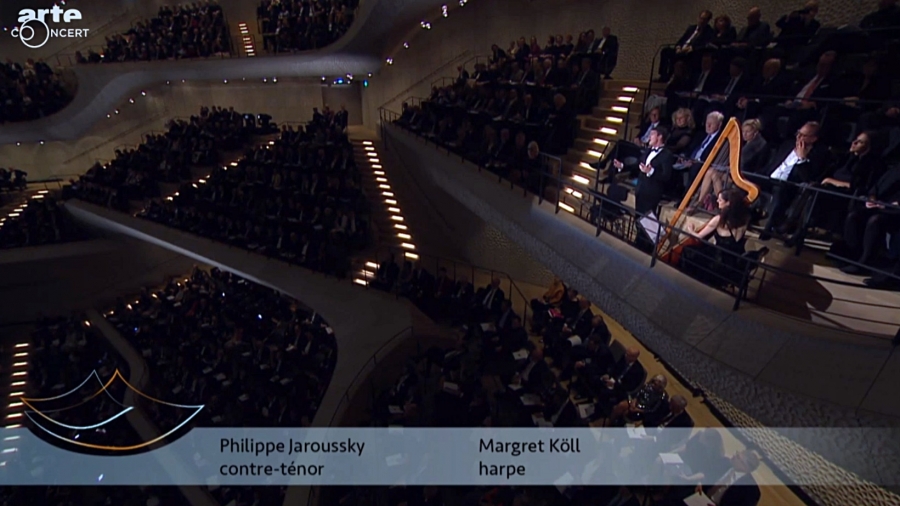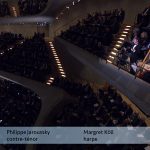It’s hard to say for whom it was the greater honour: for Philippe Jaroussky to be the very first singer ever at the Elbphilharmonie, or for Hamburg, and, on a larger scale, Germany, to have secured a musician of indisputable world class to open the new venue.
After a stony trail of mismanagement and miscalculations concerning the planning of the gargantuan project, the Elbphilharmonie was finally inaugurated. Accordingly, a great amount of pressure was on the shoulders of the NDR Elbphilharmonie Orchester and Thomas Hengelbrock, and also on that of the organisers. They had to balance introducing the hall as a public property, where everyone would be welcome and invited (the tickets for the two opening nights were all given away via a lottery), and creating an event that would be up to international standards in terms of performance, before an audience including our chancellor and other government officials, in an arena where the sound of the hall, designed by famed acoustician Yasuhisa Toyota, would be under public scrutiny. You can read more about his work here: [x]
Summary: it turns out you can’t please everybody. Some weren’t entirely happy with the sound (from a weird angle, as has been amended), some were overjoyed, some bemoaned the choice of pieces and composers. Actually, there was only one thing that drew unanimous consent: Mr. Jaroussky’s performance.
No matter what the general mood of the review, no one managed to find any fault in him. He was amazing. You don’t have to take me word for it; here’s…
… Die Welt, …
“Zum Glück werden die frühbarocken de Cavalieri- und Caccini-Solomadrigale von dem hinreißenden Philippe Jaroussky gesungen.”
[Luckily, the early baroque madrigals by de Cavalieri and Caccini are sung by the ravishing Philippe Jaroussky.]
… Die Zeit, …
“Als der Countertenor Philippe Jaroussky kurz vor der Pause die Arie Amarilli Mia Bella von Giulio Caccini singt, lediglich von einer Barockharfe begleitet, wirkt das Publikum zum ersten und einzigen Mal gebannt und betört, der angespannten Situation völlig entrückt.”
[Only right before the intermission, when the countertenor Philippe Jaroussky sings “Amarilli, mia bella” by Giulio Caccini, the audience seems to be spellbound and enraptured, completely set free from the tension.]
… FAZ, …
“Gute Sänger haben es gut: Wenn Countertenor Philippe Jaroussky mit seiner schmelzenden Zauberstimme den Renaissance-Schlager „Amarilli mia bella“ von Giulio Caccini hoch oben von Block L heruntersingt, sparsam begleitet von den glockig-zirpenden Stütztönen, die Barockharfenistin Margret Köll zuliefert, so wird das zum kulinarischen Hochgenuss.”
[That’s good news for good singers: when countertenor Philippe Jaroussky, with his mellifluous enchanting voice, is singing the Renaissance evergreen “Amarilli mia bella” by Giulio Caccini, from high above at block L, sparingly accompanied by the bell-like, chirping sustaining notes provided by the Baroque harpist Margret Köll, it turns out to be a feast.]
and my personal favourite, ... Die Süddeutsche Zeitung
“… Wer aber Jaroussky schon an anderen Orten und unter schlechteren akustischen Bedingungen gehört hat, weiß, dass dieser Mann immer so gut singt: androgyn, distanziert und mit einer leichten Drohung in der Tonfärbung, irgendwo zwischen Sadismus und Exzess. Die Akustik Yasuhisa Toyota[s] ändert rein gar nichts an Jarousskys phänomenalem Können. Sie erlaubt es aber dem Konzertbesucher, jede noch so feine Nuance seines Gesangs zu hören. Das allein ist schon grandios.”
[… However, [anyone] who has listened to Jaroussky before, in other locations, and under worse acoustic circumstances, knows that this man always sings this well: androgynous, distanced, and with a slight menace to the colouring of his voice, somewhere between sadism and excess. Yasuhisa Toyota’s acoustics change nothing at all about Jaroussky’s phenomenal skill; however, it allows the listener to experience the slightest nuances of his singing, This alone is terrific.]
But hear for yourself!
Because I didn’t see it mentioned anywhere, let me add an extra credit because only the day before the inauguration, Jaroussky had sung the last performance of Alcina in Zürich – Ruggiero, a whale of a role. So, probably as the only one from the cast, he wasn’t allowed to party after the dernière but had to get ready for Hamburg without any break. Furthermore, I can only imagine what it means to sing as the very first singer at an event of that scale, and without the comforting blanket of an orchestra, knowing every shade of what you do is going to be perceptible, for good and for worse, by the roughly 2000 people in the live audience, and the audience following the live stream worldwide, with people zooming in on Google 3D – including many people who most likely will never have heard you before. In short: a true feat, and a memorable performance.
Let’s hope his glorious singing broke the spell of bad luck that was hovering above the project!
Finally, my own two cents: as a person from Stuttgart, I’d happily take roughly ten times an Elbphilharmonie (and counting) for a probably eternally unfinished Stuttgart 21.
You can still watch the stream! Head to the …
Youtube channel of the NDR Elbphilharmonie Orchester: [x] … or to ARTE Concert! [x]


